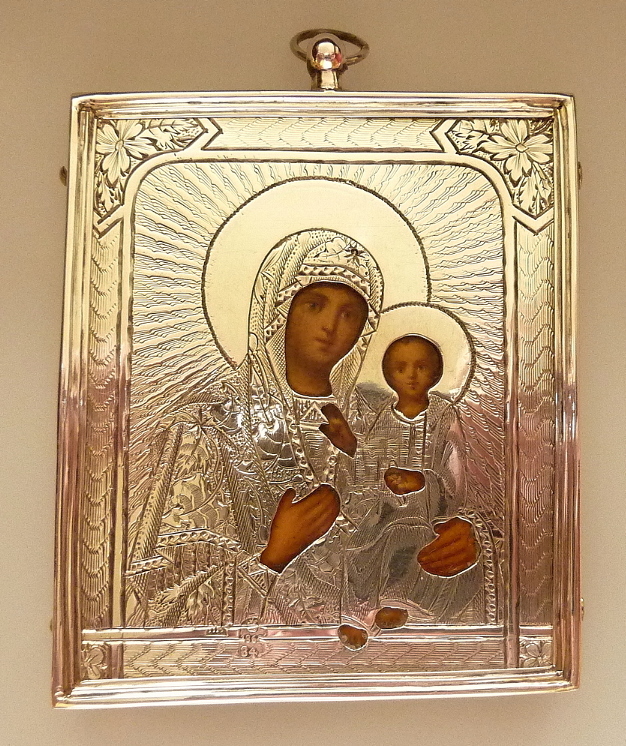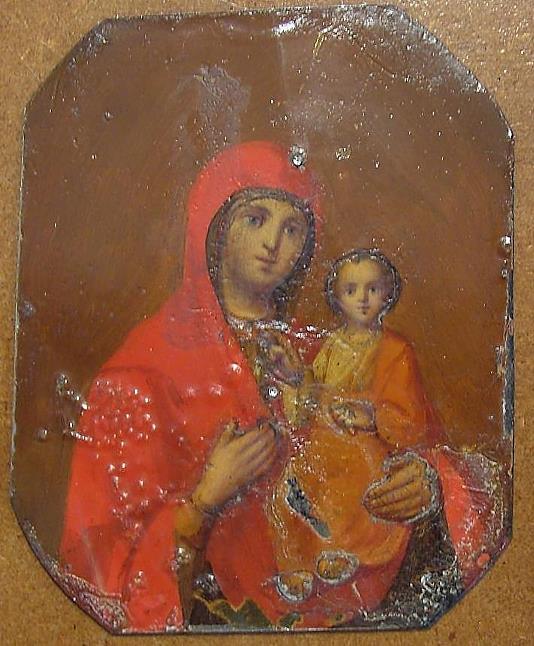The icon bearing the hallmark in question Is depicted below.
https://imgur.com/bg7Riog
Hallmark on the riza, at the bottom left corner:
https://imgur.com/tRPKDf0
On the back of the icon, there is an impression on the wood surface, which also looks like a hallmark:
https://imgur.com/qULgZgf
This icon left Serbia in 1926. Its age/history is important to me.
Any help in desciphering the hallmark (other than 84 meaning that the riza is silver) would be appreciated.
Thanks.
Hallmark identification on icon
Re: Hallmark identification on icon
Hi,
Welcome to the Forum.
Please embed your images.
Trev.
Welcome to the Forum.
Please embed your images.
Trev.
-
MosGheorghe
- Posts: 4
- Joined: Wed Jan 02, 2019 8:20 am
Re: Hallmark identification on icon
Pictures of the item bearing the hallmark in question are depicted below.


On the back of the icon, there is an impression on the wood surface, which also looks like a hallmark:


This icon left Serbia in 1926, and stayed in the same family before and since 1926.
Any help in deciphering the hallmark (other than 84 meaning that the riza is silver) would be appreciated.
Thanks.


On the back of the icon, there is an impression on the wood surface, which also looks like a hallmark:


This icon left Serbia in 1926, and stayed in the same family before and since 1926.
Any help in deciphering the hallmark (other than 84 meaning that the riza is silver) would be appreciated.
Thanks.
Re: Hallmark identification on icon
Hi,
Marks are not consistent with Russian marks in spite of 84 (if that`s the fineness).
Besides, it`s very unusual to have the same marks on riza and wood.
The icon does not look very old (possibly late 19th century or even younger).
Kingdom of Yugoslavia at the time had well established system of silver marks, not consistent with the marks shown here.
Grece cannot be excluded, though.
Is there any chance to check the fineness of riza without damaging it ?
That`s all I can tell, in short, does not look Russian.
Regards
Marks are not consistent with Russian marks in spite of 84 (if that`s the fineness).
Besides, it`s very unusual to have the same marks on riza and wood.
The icon does not look very old (possibly late 19th century or even younger).
Kingdom of Yugoslavia at the time had well established system of silver marks, not consistent with the marks shown here.
Grece cannot be excluded, though.
Is there any chance to check the fineness of riza without damaging it ?
That`s all I can tell, in short, does not look Russian.
Regards
Re: Hallmark identification on icon
Hi MosGheorghe -
sorry but there are several serious incongruities:
1) the story - since 93 years in your posession (several World Wars and local wars later) the icon is savely in your home....
2) the condition is artificially (chemically) aged - environmental caused influences and real patina (silver oxidation) looks completely different ...
3) the sujet looks brand new, rather Greek - but absolutely not Russian , no cracks in the paint etc...
4) the marks are pure phantasy - imitating a Russian stamping in a meaningless way...
In my opinion a fake!
Here an example of a small travel Icon - where you can see the style of painting.


Regards
Goldstein
sorry but there are several serious incongruities:
1) the story - since 93 years in your posession (several World Wars and local wars later) the icon is savely in your home....
2) the condition is artificially (chemically) aged - environmental caused influences and real patina (silver oxidation) looks completely different ...
3) the sujet looks brand new, rather Greek - but absolutely not Russian , no cracks in the paint etc...
4) the marks are pure phantasy - imitating a Russian stamping in a meaningless way...
In my opinion a fake!
Here an example of a small travel Icon - where you can see the style of painting.


Regards
Goldstein
-
MosGheorghe
- Posts: 4
- Joined: Wed Jan 02, 2019 8:20 am
Re: Hallmark identification on icon
Thank you, both, for your replies. My interest does not lie in the commercial value of this icon, but in its history. I am pretty sure that the icon is authentic.


Serbian iconography had influences from the Cretan school; this ties nicely with your suggestion of the icon looking Greek.
AG2012, sorry, but I cannot check the fineness of the riza without damaging it. Thanks for your insight.
Regards,
MosGheorghe
Icons are objects of veneration for Orthodox Christians, and many families have taken their icons, as their protectors and most prized possessions, during times of extreme hardship.Goldstein: ... since 93 years in your posession (several World Wars and local wars later) the icon is savely in your home....
Goldstein: ... no cracks in the paint


Serbian iconography had influences from the Cretan school; this ties nicely with your suggestion of the icon looking Greek.
AG2012, sorry, but I cannot check the fineness of the riza without damaging it. Thanks for your insight.
Regards,
MosGheorghe
Re: Hallmark identification on icon
Hello again,
Orthodox iconography has it`s rules but sometimes with local languages and alphabet influences.
E.g. Latin alphabet in Romanian icons,Greek alphabet in icons made in Greece etc.
You are right about icons being precious family items, but identification based on ``kept in the same family for decades`` is not a method of judgement, unless there is very reliable provenance,e.g.taken by Greeks when leaving Asia Minor after WW I.
The lettering at the bottom is Church Old Slavic and ``O`` above Christ is often written as Omega in Greek icons.
I think every educated Orthodox priest can help with the meaning of letters and inscription.
Balkan countries (being under Ottoman rule) developed silver marking systems in late 19th century, but Greece did not, not even today.
Regards
Orthodox iconography has it`s rules but sometimes with local languages and alphabet influences.
E.g. Latin alphabet in Romanian icons,Greek alphabet in icons made in Greece etc.
You are right about icons being precious family items, but identification based on ``kept in the same family for decades`` is not a method of judgement, unless there is very reliable provenance,e.g.taken by Greeks when leaving Asia Minor after WW I.
The lettering at the bottom is Church Old Slavic and ``O`` above Christ is often written as Omega in Greek icons.
I think every educated Orthodox priest can help with the meaning of letters and inscription.
Balkan countries (being under Ottoman rule) developed silver marking systems in late 19th century, but Greece did not, not even today.
Regards
-
MosGheorghe
- Posts: 4
- Joined: Wed Jan 02, 2019 8:20 am
Re: Hallmark identification on icon
Thank you, AG2012, for the additional insight.
I am grateful for all the work done and information available on 925-1000.com.
All the best,
MosGheorghe
I am grateful for all the work done and information available on 925-1000.com.
All the best,
MosGheorghe